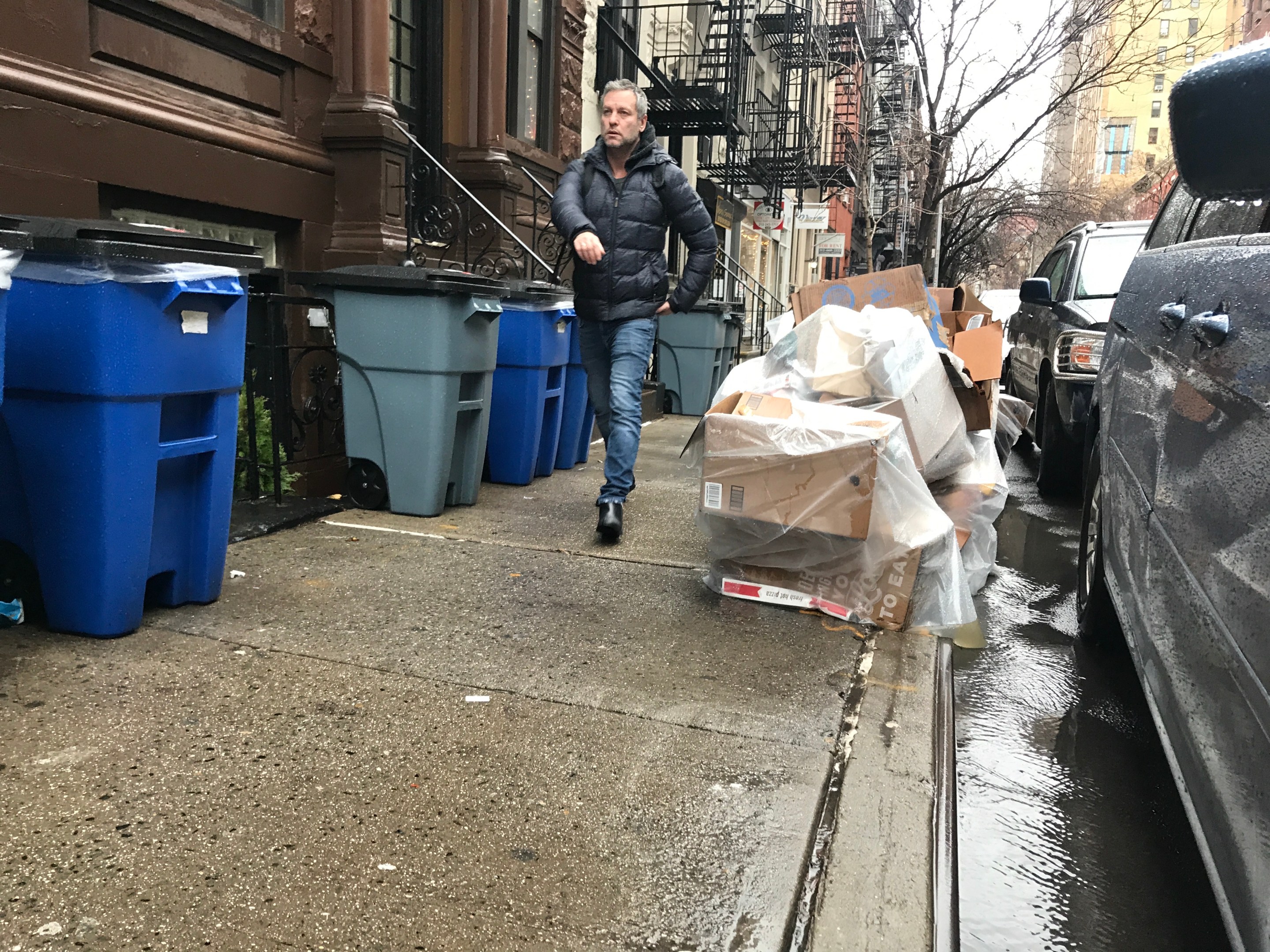A sizable majority of residents of Hells Kitchen and Chelsea — and more than two-thirds of people with disabilities — say city sidewalks are badly maintained and dangerous, and advocates are calling for the city to make sidewalk maintenance and planning a municipal responsibility instead of requiring property owners to do the job of government.
In a new survey of nearly 1,000 people by the neighborhood's community board [PDF], 59 percent of residents — including 68 percent of residents with disabilities — rated sidewalks as "poor" or "very poor." And 79 percent of residents said that sidewalks are dirty "often," "very often" or "all of the time." And 85 percent said they trip at least occasionally on a New York City sidewalk.
The survey is part of a push by Community Board 4 and the venerable Hells Kitchen pedestrian group CHEKPEDS to encourage the city to regain control of sidewalks from private property owners, who do not do a good enough job and have not been held accountable by the city since the Bloomberg-era rule change that led to what advocates call the current decline in cleanliness and safety.
"The big ask is for sidewalk maintenance and repair be returned to the city," said Christine Berthet, the group's leader and a member of CB4. "[Maintaining sidewalks] has put a burden on small businesses. A smaller ask would be to treat sidewalk repairs the same as roadways. When there is a pothole on the road, it must be repaired in 15 days. We want the same for sidewalks. We want the same level of service."
In a letter to Deputy Mayor Laura Anglin and Council Speaker Corey Johnson, CB4 said it had unanimously voted to demand that the city "initiate a review of current practices in the Departments of Transportation and Sanitation related to sidewalk repairs and maintenance [because] our residents expressed a high level of dissatisfaction with the overall level of service they receive." The letter reminded city officials that even though property owners are in charge of the sidewalk, the city must still repair pedestrian ramps and curbs, clear snow after storms and respond promptly to 311 complaints.
And snow is definitely an issue: Roughly half of all respondents, and 67 percent of those with disabilities, said sidewalk ramps and corners are often impassable due to uncleared snow. As Streetsblog reported, this was a huge problem this winter.
The @NYC_DOT and @NYCDDC boondoggle that is the Flushing Ave bike lane continues to impress. Very little clearing of sidewalks or bike lanes on the @BklynNavyYard perimeter except in a few spots by gates or retail. #bikenyc @bikenewyork pic.twitter.com/UjQcsn835c
— brendan gray (@brendan_gray) December 21, 2020
Many residents said they complained about sidewalk obstructions to 311, but not much is done about it — residents said their complaints are unresolved 79 percent of the time (68 percent for snowy condition complaints).
"I've never had a satisfactory response from 311," an anonymous resident said on the report. "You report, and get an email stating that they are looking into the problem. As is with nose complaints, no one actually comes to investigate in a timely manner."
Working with CHEKPEDS and Open Plans (the parent company of Streetsblog), the New York Lawyers for the Public Interest is calling on city officials to take control of sidewalks — "the primary artery of transportation for most" people — rather than continue to rely on property owners.
City officials must "consider legislation which assigns primary responsibilities to provide safe and accessible sidewalks to the city, rather than continuing to burden affected New Yorkers with these duties," stated the letter. The groups certainly praised the city's Open Restaurant program for saving many eateries during the COVID-19 pandemic, but cautioned that it also has created hell for walkers.
"Restaurants [must] maintain clear path of travel on sidewalks and [comply] with the Americans with Disabilities Act [but] this guidance is frequently ignored and not enforced," the letter stated. "When sidewalks and corners are blocked, not just by dining setups but also by staff and patrons, people with disabilities are forced into the city's busy streets, endangering themselves and others."
CB4 and CHEKPEDs are often canaries in the coal mine of sidewalk issues, often drawing attention to local problems that exist across the city. In 2020, CHEKPEDs converted a parking space into a trash corral, for example, to highlight the problem.






